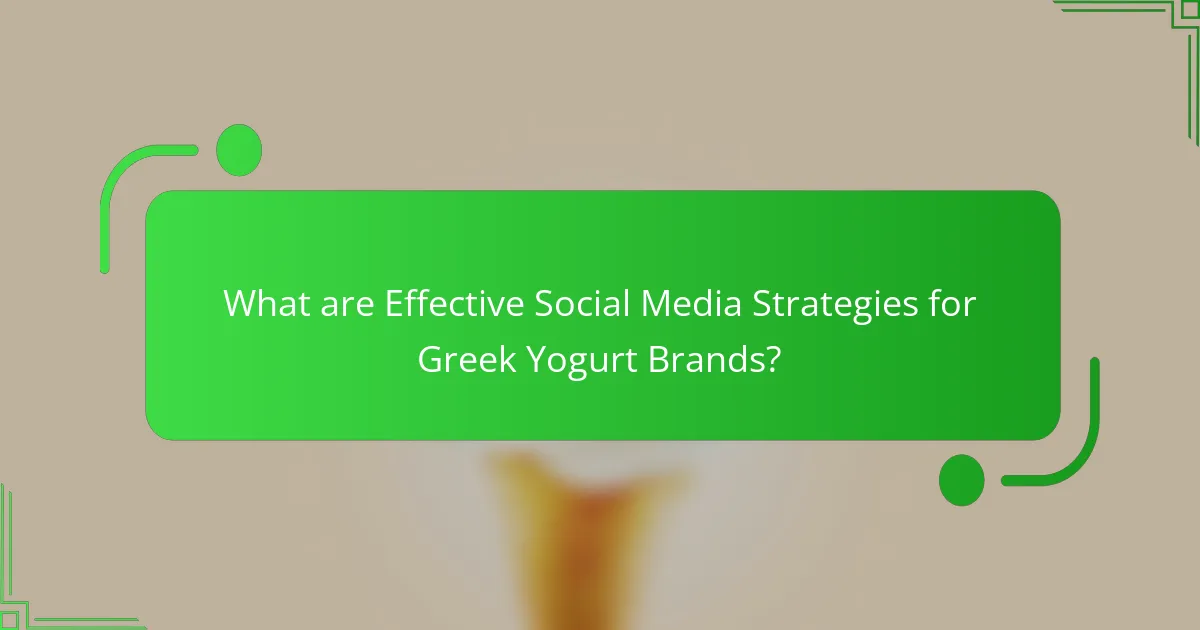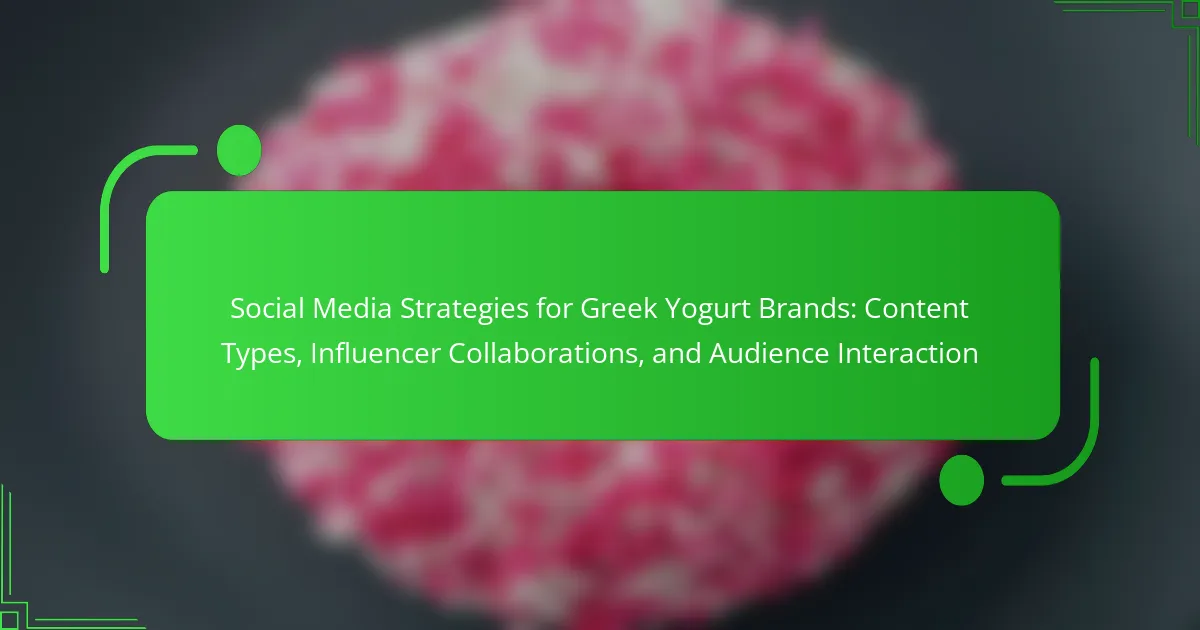Social media strategies for Greek yogurt brands focus on engaging content, influencer collaborations, and interactive campaigns to enhance brand visibility and customer loyalty. Effective content includes recipes, health benefits, and product versatility, supported by eye-catching visuals. Collaborating with health and wellness influencers can increase credibility and reach niche markets, as consumers often rely on influencer recommendations for purchasing decisions. Interactive elements such as polls, quizzes, and user-generated content campaigns encourage audience participation and build community. Timely responses to customer inquiries further strengthen brand loyalty, highlighting the importance of active engagement on social media platforms.

What are Effective Social Media Strategies for Greek Yogurt Brands?
Effective social media strategies for Greek yogurt brands include engaging content, influencer partnerships, and interactive campaigns. Engaging content showcases recipes, health benefits, and product versatility. Brands should use eye-catching visuals and informative posts to attract attention. Collaborating with health and wellness influencers can expand reach and credibility. These influencers can create authentic content that resonates with their followers. Interactive campaigns, such as polls and contests, encourage audience participation and feedback. Utilizing user-generated content can foster community and brand loyalty. According to a survey by Sprout Social, 79% of consumers prefer brands that respond to their questions on social media. This highlights the importance of timely interaction with the audience.
How do social media strategies impact brand awareness for Greek yogurt?
Social media strategies significantly enhance brand awareness for Greek yogurt. Engaging content increases visibility and attracts potential customers. Regular posts on platforms like Instagram and Facebook create a consistent brand presence. Influencer collaborations introduce Greek yogurt to wider audiences. User-generated content fosters community and trust. Campaigns that highlight health benefits resonate with health-conscious consumers. According to a study by the Journal of Marketing Research, effective social media engagement can boost brand recall by up to 70%. This demonstrates the powerful role social media plays in elevating Greek yogurt brands.
What role does content variety play in engaging audiences?
Content variety plays a crucial role in engaging audiences. It keeps the audience interested and encourages them to interact. Different formats, such as videos, images, and articles, cater to diverse preferences. This diversity increases the likelihood of sharing and commenting. Research shows that posts with varied content generate 94% more total views. Engaging content also fosters a sense of community among followers. It helps brands to stand out in a crowded market. Consistent content variety can lead to higher retention rates. Ultimately, it enhances brand loyalty and drives conversions.
How can Greek yogurt brands measure the effectiveness of their social media strategies?
Greek yogurt brands can measure the effectiveness of their social media strategies through specific metrics. These metrics include engagement rates, which reflect how users interact with posts. Brands should track likes, shares, and comments to gauge audience interest. Additionally, follower growth indicates brand reach and awareness over time.
Analyzing click-through rates on links shared in posts shows how effective content is in driving traffic. Conversion rates are crucial for understanding how social media efforts translate into sales. Brands can also utilize social listening tools to assess sentiment and feedback from consumers.
Finally, comparing performance against industry benchmarks provides context for success. These methods collectively help Greek yogurt brands evaluate their social media impact effectively.
Why is audience understanding crucial for Greek yogurt brands on social media?
Audience understanding is crucial for Greek yogurt brands on social media because it informs targeted marketing strategies. Knowing the demographics and preferences of consumers helps brands tailor their content effectively. For instance, younger audiences may prefer vibrant visuals and health-related messaging. In contrast, older consumers may value traditional recipes and nutritional benefits.
Brands that understand their audience can engage followers more authentically. Engagement rates are significantly higher when content resonates with the audience’s interests. According to a study by Sprout Social, 70% of consumers feel more connected to brands that understand them. This connection can lead to increased brand loyalty and higher sales.
Furthermore, audience insights can guide influencer collaborations. Selecting influencers who align with the target demographic enhances credibility and reach. Overall, audience understanding drives effective communication and fosters community on social media platforms.
What demographics are most engaged with Greek yogurt brands?
Millennials and health-conscious consumers are the most engaged demographics with Greek yogurt brands. Research indicates that 39% of Greek yogurt consumers are aged 18-34. This age group values health benefits and protein content in their diets. Additionally, women represent a significant portion of the consumer base, often prioritizing nutritious snacks. According to a Nielsen report, 54% of yogurt consumers are female. These demographics actively seek out Greek yogurt for its perceived health advantages. The trend highlights a growing interest in healthy eating among younger adults.
How can brands use audience insights to tailor their content?
Brands can use audience insights to tailor their content by analyzing demographic data and engagement metrics. This analysis helps identify the preferences and behaviors of target audiences. Brands can segment their audience based on interests, age, and location. Tailored content can then address specific needs or preferences of each segment. For example, Greek yogurt brands can create recipes targeting health-conscious consumers. They can share nutritional benefits that resonate with fitness enthusiasts. Additionally, brands can track engagement rates to refine their content strategies continuously. Insights from social media interactions guide brands in optimizing their messaging and formats.
What types of content resonate best with audiences for Greek yogurt brands?
Engaging visual content resonates best with audiences for Greek yogurt brands. High-quality images and videos showcasing recipes attract attention. Educational content about health benefits enhances viewer interest. User-generated content encourages community engagement and brand loyalty. Interactive posts, like polls and quizzes, increase audience participation. Seasonal recipes align with consumer trends and preferences. Influencer collaborations amplify reach and credibility. These content types drive engagement and foster brand connection.
How do visual content and storytelling enhance engagement?
Visual content and storytelling enhance engagement by capturing attention and creating emotional connections. Visuals are processed 60,000 times faster than text. This speed leads to immediate interest. Storytelling provides context and relatability. It helps audiences connect with the brand on a personal level. Brands that use storytelling see a 22% increase in engagement. This is supported by research from the Harvard Business Review, which highlights the effectiveness of narratives in marketing. Engaging stories paired with visuals can significantly boost audience retention and sharing.
What are the benefits of user-generated content for Greek yogurt brands?
User-generated content (UGC) offers significant benefits for Greek yogurt brands. It enhances brand authenticity by showcasing real customer experiences. UGC fosters community engagement, encouraging customers to share their personal stories. This interaction leads to increased brand loyalty as consumers feel more connected. Additionally, UGC serves as valuable social proof, influencing potential buyers’ purchasing decisions. Research indicates that 79% of people say user-generated content highly impacts their purchasing decisions. Furthermore, UGC provides cost-effective marketing material, reducing the need for extensive advertising budgets. Overall, integrating user-generated content can drive sales and improve brand perception for Greek yogurt brands.

How can Influencer Collaborations Enhance Greek Yogurt Brand Strategies?
Influencer collaborations can significantly enhance Greek yogurt brand strategies by increasing visibility and credibility. Influencers have established trust with their audiences. This trust translates into higher engagement rates for brand promotions. Collaborating with influencers allows brands to reach niche markets effectively. Research shows that 49% of consumers depend on influencer recommendations for purchase decisions. Influencers can create authentic content that resonates with their followers. This content often leads to increased brand loyalty and customer retention. By leveraging influencers, Greek yogurt brands can differentiate themselves in a competitive market.
What criteria should Greek yogurt brands consider when selecting influencers?
Greek yogurt brands should consider audience alignment when selecting influencers. The influencer’s followers should match the brand’s target demographic. Engagement rates are also crucial; brands should prioritize influencers with high interaction levels. Authenticity is important; influencers should genuinely enjoy and use Greek yogurt products. Content quality matters; the influencer’s posts should reflect professionalism and creativity. Lastly, brand values alignment is essential; the influencer’s beliefs should resonate with the brand’s mission.
How can influencer authenticity impact brand perception?
Influencer authenticity significantly impacts brand perception by fostering trust and credibility. Authentic influencers share genuine experiences and opinions about products. This honesty resonates with their audience, leading to stronger emotional connections. Research indicates that 92% of consumers trust recommendations from individuals over brands. When influencers are perceived as authentic, their endorsements can enhance brand reputation. Conversely, inauthenticity can result in skepticism and damage brand image. Studies show that consumers are more likely to engage with brands endorsed by authentic influencers. This engagement often translates into increased loyalty and sales for the brand.
What types of collaborations yield the best results for Greek yogurt brands?
Influencer partnerships yield the best results for Greek yogurt brands. Collaborating with health and fitness influencers increases brand visibility. Influencers can create authentic content that resonates with their audience. This type of collaboration often leads to higher engagement rates. Research shows that 49% of consumers rely on influencer recommendations. Additionally, co-branding with health-focused products enhances credibility. Collaborations with chefs or nutritionists can also provide unique recipe content. These partnerships help to position Greek yogurt as a versatile ingredient in healthy eating.
Why is it essential to measure the success of influencer partnerships?
Measuring the success of influencer partnerships is essential for evaluating marketing effectiveness. It provides insights into return on investment (ROI) from collaborations. Tracking metrics such as engagement rates, reach, and conversions helps brands understand audience response. For example, a study by Influencer Marketing Hub found that 63% of marketers believe measuring ROI is crucial for influencer campaigns. This data reinforces the importance of assessment in optimizing strategies. Additionally, understanding what works enables brands to refine future influencer selections. Thus, measurement drives informed decision-making in social media strategies.
What metrics should brands track to evaluate influencer effectiveness?
Brands should track engagement rate, reach, impressions, and conversion rate to evaluate influencer effectiveness. Engagement rate measures the interaction level between the influencer’s audience and the content. This includes likes, comments, and shares, which indicate audience interest. Reach shows how many unique users have seen the content. Impressions reflect the total number of times the content has been displayed. Conversion rate tracks the number of users who take a desired action, such as making a purchase after interacting with the influencer’s content. These metrics provide a comprehensive view of an influencer’s impact on brand awareness and sales.
How can brands adjust their strategies based on influencer performance data?
Brands can adjust their strategies by analyzing influencer performance data. They should track engagement metrics like likes, shares, and comments. This data reveals which influencers resonate with their target audience. Brands can identify high-performing content types through this analysis. They can then allocate budget to influencers who drive the most engagement. Adjusting content strategies based on audience preferences enhances campaign effectiveness. Brands can also refine their messaging to align with successful influencer narratives. Continuous monitoring allows for real-time strategy adjustments. This data-driven approach ultimately leads to improved ROI in influencer marketing campaigns.

How to Foster Audience Interaction for Greek Yogurt Brands?
To foster audience interaction for Greek yogurt brands, brands should engage their audience through interactive content. This includes polls, quizzes, and questions that encourage responses. Brands can also host giveaways that require audience participation. User-generated content campaigns allow customers to share their experiences with the product. Responding promptly to comments and messages builds a community feel. Collaborating with influencers can amplify reach and create engaging content. Regularly sharing recipes or health tips related to Greek yogurt invites ongoing dialogue. According to a study by Sprout Social, brands that engage actively see a 20% increase in customer loyalty.
What strategies can Greek yogurt brands use to encourage audience engagement?
Greek yogurt brands can use interactive content to encourage audience engagement. This includes polls, quizzes, and challenges that invite consumers to participate. Brands can also leverage user-generated content by encouraging customers to share their recipes or experiences. Collaborating with influencers can enhance reach and credibility. Hosting giveaways and contests can stimulate excitement and participation. Engaging storytelling through posts can create emotional connections with the audience. Regularly responding to comments and messages fosters a sense of community. Brands should analyze engagement metrics to refine their strategies effectively.
How can interactive content boost audience participation?
Interactive content boosts audience participation by engaging users directly in the experience. This type of content includes quizzes, polls, and interactive videos. Such formats encourage users to respond and share their opinions. According to a study by Content Marketing Institute, interactive content generates two times more engagement than static content. Additionally, 93% of marketers believe interactive content is effective in educating the audience. This engagement leads to increased brand loyalty and a stronger community. Consequently, Greek yogurt brands can leverage interactive content to foster deeper connections with their audience.
What role do contests and giveaways play in audience interaction?
Contests and giveaways significantly enhance audience interaction. They create excitement and engagement among followers. These activities encourage users to participate actively, often leading to increased brand visibility. For instance, brands can gain more followers as participants share the contest with their networks. Research shows that 70% of consumers report increased engagement with brands that host contests. Additionally, contests can lead to user-generated content, further fostering community involvement. By incentivizing participation, brands can cultivate loyalty and strengthen relationships with their audience.
How can Greek yogurt brands effectively respond to audience feedback?
Greek yogurt brands can effectively respond to audience feedback by actively monitoring social media platforms. They should utilize social listening tools to track mentions and sentiments regarding their products. Engaging directly with consumers through comments and messages fosters a sense of community. Acknowledging both positive and negative feedback demonstrates transparency and builds trust. Implementing changes based on feedback can enhance customer satisfaction and loyalty. Regularly updating consumers on improvements shows that their opinions are valued. Brands can also create polls or surveys to gather specific insights from their audience. This proactive approach can lead to better product development and stronger brand-consumer relationships.
What are best practices for managing comments and messages on social media?
Best practices for managing comments and messages on social media include timely responses, active engagement, and maintaining a positive tone. Responding quickly shows followers that their input is valued. Engaging with comments encourages community interaction and fosters brand loyalty. Using a friendly and professional tone helps create a welcoming environment. Monitoring comments regularly allows brands to address concerns promptly. Utilizing automated responses for common inquiries can save time while ensuring users feel acknowledged. Personalizing responses can enhance user experience and strengthen relationships. According to a Sprout Social report, 70% of consumers expect brands to respond within 24 hours. This statistic highlights the importance of timely and effective communication on social media platforms.
How can brands turn negative feedback into positive engagement opportunities?
Brands can turn negative feedback into positive engagement opportunities by actively responding to customer concerns. Acknowledging the feedback shows customers that their opinions matter. This can lead to improved customer satisfaction. Additionally, addressing issues publicly can enhance brand transparency. Offering solutions or compensations can turn dissatisfied customers into loyal advocates. Engaging in conversations can create a sense of community. Research shows that brands that engage with negative feedback can increase customer loyalty by up to 25%. By transforming complaints into constructive dialogues, brands can foster a positive brand image.
What are some best practices for Greek yogurt brands to optimize their social media strategies?
Greek yogurt brands should focus on engaging content, influencer partnerships, and community interaction to optimize their social media strategies. Engaging content includes recipes, health benefits, and lifestyle tips that resonate with target audiences. Influencer partnerships can amplify brand messages and reach broader demographics, particularly health-conscious consumers. Community interaction builds brand loyalty; responding to comments and messages fosters a sense of connection. Regularly analyzing social media metrics helps brands refine strategies and improve engagement. Utilizing visually appealing images and videos can enhance posts, making them more shareable. Consistent posting schedules maintain audience interest and visibility. Brands should also leverage user-generated content to showcase customer experiences and testimonials, enhancing authenticity.
Social media strategies for Greek yogurt brands focus on engaging content, influencer collaborations, and audience interaction to enhance brand awareness and loyalty. Key topics include the importance of diverse content types, such as recipes and health benefits, and the role of influencers in expanding reach and credibility. The article also emphasizes the significance of understanding audience demographics and preferences to tailor content effectively. Additionally, it discusses methods for measuring the effectiveness of social media efforts and best practices for fostering community engagement through interactive campaigns and user-generated content.


